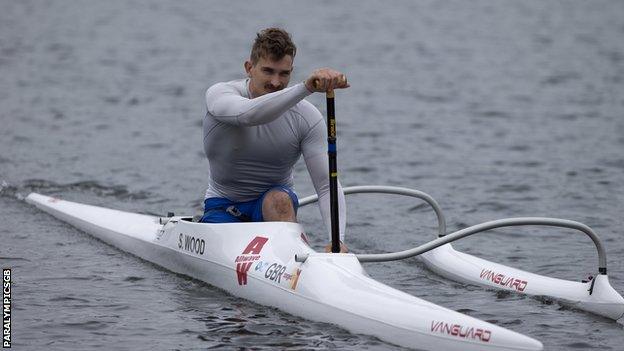Para-canoeing at Tokyo Paralympics: All you need to know
- Published

Stuart Wood will be paddling a va'a boat in Tokyo
Paralympic Games on the BBC |
|---|
Venue: Tokyo, Japan Dates: 24 August-5 September Time in Tokyo: BST +8 |
Coverage: Follow on Radio 5 Live and on the BBC Sport website |
Key information
Dates: 2-4 September
Venue: Sea Forest Waterway
Gold medals on offer: Nine
How does it work?
Having made its Paralympic debut in Rio, the Tokyo Para-canoe programme has expanded with both kayak (KL) and va'a (VL) races - men's and women's KL1, KL2 and KL3 plus men's VL2 and VL3 and women's VL2.
The va'a is a long canoe with an outrigger on one side. Athletes use a single-bladed paddle, rather than the double-blade paddle used in the kayak events. However, in both events, athletes paddle 200 metres in lanes.
KL1 athletes have no or very limited trunk function and no leg function and typically need a special seat with high backrest in the kayak.
KL2 athletes have partial trunk and leg function and while able to sit upright in the kayak might need a special backrest and have limited leg movement during paddling.
KL3 athletes have trunk function and partial leg function, are able to sit with their trunk in a forward flexed position in the kayak and are able to use at least one leg or prosthesis.
VL2 athletes are given a score depending on their trunk function and leg function and the class includes athletes who score lower in the one function than the other.
VL3 athletes have full or almost-full dynamic trunk function
Who are the British medal hopes?
GB topped the sport's medal table in Rio and have continued their dominance since. Jeanette Chippington (KL1 ) and Emma Wiggs (KL2) will be defending their Paralympic titles. Wiggs will be up against team-mate, current world and European champion and three-time swimming medallist Charlotte Henshaw in the kayak event. But Wiggs also has a strong medal chance in the VL2 event. Paralympic debutant Stuart Wood will be hoping to make a big impact in the VL3 category.
Who are the other challengers?
Hungarian teenager Peter Pal Kiss, the European and world champion in the KL1 category, will be going for a clean sweep of titles aged just 18, while Ukraine's Serhii Yemelianov has dominated the KL3 event since winning gold in Rio. Australia's Curtis McGrath, who had both of his legs amputated as a result of a mine blast while serving in the Australian Army in Afghanistan, goes in both the KL2 and VL3 events. McGrath was the Australian team captain at the 2014 Invictus Games in London before going on to win Paralympic gold in Rio.
Did you know?
The Australian team boats will incorporate a piece of Indigenous artwork by Rheanna Lotter, entitled 'The Journey', after a special request was made by the squad. The symbolic design features interconnected circles while boomerangs highlight the challenges athletes have faced before the Games.
ParalympicsGB Rio 2016 medals
Five - three gold (Jeanette Chippington, Emma Wiggs and Anne Dickens) and two bronze (Ian Marsden and Nick Beighton)